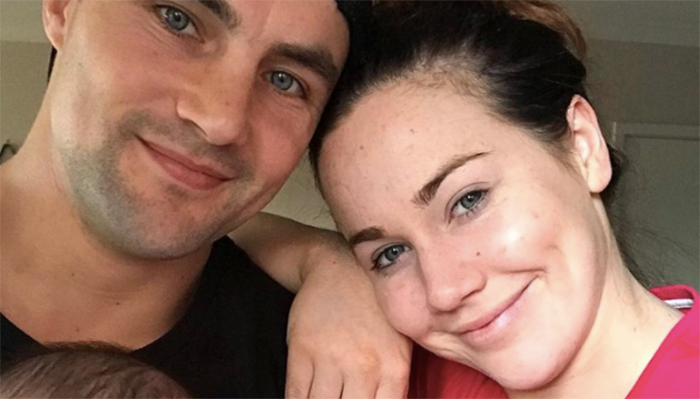This New Mom Wet Her Pants — and Wrote About It on Facebook

You don’t expect to pee your pants as an adult, but that’s exactly what happened to one mommy blogger — and she shared the entire experience on Facebook.
Sophie Cachia, who writes the blog The Young Mummy, revealed in a Facebook post on Tuesday that’s gone viral that she wet herself while being stuck in traffic. “This here is a picture of a beautiful baby girl, a devoted father & husband, and a wife who just called that devoted husband to come out the front to her rescue with two towels because she totally pissed her pants in her car,” she wrote next to a photo of her family. “Yep. That’s right. A full bottle of water, a 4-month-postpartum pelvic floor, and a freeway standstill with traffic is NEVER a good combo. And not just a dribble. Nope. It appears when you’re so desperately holding on and you finally crack, the floodgates open and they cannot be shut. I truly never thought this would happen to me. But hey, there’s a first for everything… right?”
People weighed in on their own experiences with postpartum incontinence in the comments. “My pelvic floor has never been the same after 3 kids,” one woman wrote. “I had this happen a couple of weeks after giving birth — except I had been holding on during a breastfeed, thought I could make it to putting the kettle on before dashing to the toilet, but no…peed a full bladder all over the kitchen floor the moment I turned on the kitchen tap,” another said.
This isn’t uncommon: According to the U.S. Department of Health and Human Services’ Office on Women’s Health, pregnancy and childbirth are two of the main causes of urinary incontinence in women. In pregnancy, babies push down on a woman’s bladder, urethra, and pelvic floor muscles, the HHS reports. That pressure can weaken a woman’s pelvic floor support and cause leakage. Labor and vaginal birth can also weaken a woman’s pelvic floor support and damage nerves that control the bladder, the organization says.
Michael Cackovic, M.D., a maternal-fetal medicine physician at The Ohio State University Wexner Medical Center, tells Yahoo Beauty that this isn’t usually addressed by doctors, but it happens fairly often.
Christine Greves, M.D., a board-certified ob/gyn at the Winnie Palmer Hospital for Women and Babies, likens it to a “trampoline effect.” “Over time, if the trampoline has a lot of pressure or weight on it, it gets weaker,” she tells Yahoo Beauty. “That’s how the pelvic floor can be.” Women who suffer from postpartum urinary incontinence — which are about one-third of new moms, Greves says — can accidentally wet themselves or leak when they cough, laugh, sneeze, or jump up and down. They also may struggle to hold a full bladder as well as they used to, which can result in accidents like Cachia had.
Some women may be more at risk for postpartum urinary incontinence than others. Lauren Streicher, M.D., an associate professor of clinical obstetrics and gynecology at Northwestern University Feinberg School of Medicine, tells Yahoo Beauty that smoking, gaining a lot of weight during pregnancy, having larger babies, pushing during labor for a long time, genetic predisposition, and “simple bad luck” can be factors.
Luckily, it doesn’t last forever. “Women go into panic mode but this usually gets better over time,” Streicher says. Greves notes that postpartum urinary incontinence can last up to six months, but occasionally can be longer.
There are a few things women can do to speed up the recovery process: Jessica Shepherd, M.D., an assistant professor of clinical obstetrics and gynecology and director of Minimally Invasive Gynecology at the University of Illinois College of Medicine at Chicago, tells Yahoo Beauty that doing pelvic floor exercises postpartum can help, as well as visiting a pelvic physical therapist if the problem is severe or persists. She also recommends trying Poise Impressa, a tampon-like product that places gentle pressure against a woman’s urethra to prevent leaks. “For most women, this leakage goes away over time, but this can help bridge the gap,” Shepherd says.
If you don’t know how to do pelvic floor exercises—ask your doctor. “Most doctors will recommend but not explain how to do them and patients are uncomfortable asking,” Cackovic says. “I tell patients to tighten the muscle that they use to stop urinating and hold it for as long as they can—at least three sets of 10 every day.”
If you suffer from postpartum urinary incontinence and it doesn’t seem to be getting better with time, talk to your doctor and don’t feel weird about it. “This is one of those things that can happen postpartum — women shouldn’t be embarrassed about it,” Shepherd says.
Read more from Yahoo Style + Beauty:
Follow us on Instagram, Facebook, and Pinterest for nonstop inspiration delivered fresh to your feed, every day. For Twitter updates, follow @YahooStyle and @YahooBeauty.
